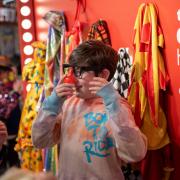Peter Shaffer’s dark and complex play, about passion misplaced or displaced, is one of those gifts that keeps on giving.
No matter how many times you enter into its intricate workings it never fails to reveal some new facet of its story, or invite you to take different sides with its characters. Audiences introduced to Equus when it was first performed in the 1970s certainly find themselves looking at it anew here, especially when set in an age where TV was regarded as an anti-social medium, and its commercial jingles were the memes of their day.
The story concerns a psychiatrist’s attempt to treat a teenager accused of blinding six horses and although based on an actual incident, constructs its own kind of detective story around his examination of a deeply-troubled mind.
As the analyst, Zubin Varla is the latest in an illustrious line of actors to tackle the demanding central role. His Professor Dysart is a nervy, incessantly-smoking professional who gradually comes to a disquieting evaluation of his own psyche. Opposite him Ethan Kai gives an equally absorbing performance as the teenage Alan Strang.
In the ‘role’ (or fetlocks?) of one of the horses Ira Mandela Siobhan is especially effective, with dramatic side lighting giving him the physical outlines and musculature of a thoroughbred.
The stillness of some of the scenes is punctuated by searing moments of theatre that are used sparingly but with astonishing effect amidst Georgia Lowe’s clinical cell-like setting. The climax becomes a theatrical exorcism of sound, light and smoke effects that heighten the psycho-sexual imagery of a play that has never been for the faint-hearted.
In any age Equus remains as pungent a drama as those menthol cigarettes on which Dysart depends.
Equus runs at The Lowry until Saturday 27th April



























